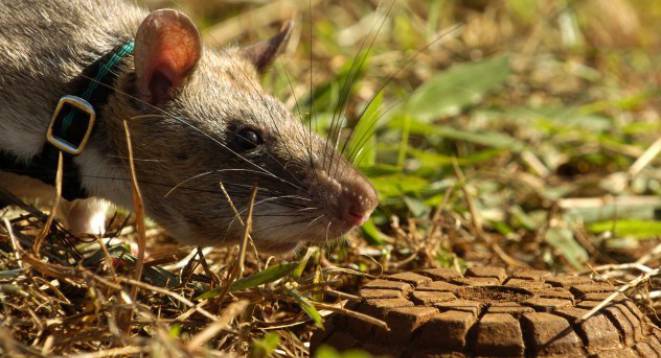How giant rodents are deactivating explosives in warzones

Growing up to 1 meter long, the African pouched rat is a giant among rodents that is not only dog-sized, but shares comparable intelligence and trainability.
James Pursey communications manager of Apopo, the social enterprise based in Tanzania training rats for landmine clearance, explains the mine detection talents of 'HeroRats' and reveals a new project for the magnificent murids in disaster situations.
How did you get the idea to use rats for mine detection?
Bart Weetjens was exploring solutions for the global landmine problem. As a rat pet owner, he came across a publication using gerbils as scent detectors. Rats, intelligent, cheap and widespread over the world were going to detect landmines, that was the start of our story. Rats have a highly developed sense of smell, they are too light to set off mines, and an African pouched rat can live 6 to 8 years. That makes them a low-tech solution to complex problems, they're also a locally available and sustainable resource, easy to transport and transferable between trainers.
Dogs are the other prevalent animal used for scent detection and they are working in many different applications. Apopo has chosen to look in to scent detection technology areas in which rats fit the bill. For example our Tuberculosis B detection involves rats running along a narrow glass tank sniffing 10 sputum samples, and in mine detection our rats are too light to set off mines.
How does the business work?
We always have been a social enterprise, in the shape of an NGO. There is often confusion on the definition of a social enterprise, and there are many social enterprises who are constituted as a charity. A Not-for-profit structure can equally allow sustainability and growth, as long as there is a revenue model in place. In our case our income mainly comes from mine action operations, which are paid for through government and UN grants. Therefore, we mostly work on request by governments of landmine affected countries, while donor countries pay for these reconstruction activities. But we also have a service delivery model to other mine action NGO's, in which we provide detection rats team that are deployed withing the context of their operations, like we do e.g. in Angola, in partnership with the Norwegian People's Aid organisation.
Will we be seeing giant detection rats sniffing out drugs in airports any time soon?
In theory, if something smells, then the rats can detect it! Drugs and illicit materials are already being detected by dogs so that means the rats could too. However, this is something that is not on our agenda in the foreseeable future.
How do organisations that might benefit from the service tend to react to the idea of rats sniffing out mines?
Initially there was lots of scepticism about scent detection technology. However, as you can see from the timeline, the idea of Apopo has been in existence since 1995 and over the last 18 years we have refined our rat training procedures and therefore their capabilities and we have supported this with hard scientific research and evidence. Above all the rats are now making a strong and real impact where they work and when donors and partners see this, they are very keen to work with us, funds prevailing.
What are your future plans for the rats?
We are looking in to a few different applications. One interesting project that has a lot of potential is our 'CameRATs' which will be used for 'search and discover'. Basically in areas of natural disaster or perhaps war zones, the rats will be sent in to collapsed buildings or wreckage to search for injured people. Dogs are already doing this but the rats have an advantage in that they can get into confined spaces. This project is still in early research stages.
If rats detecting mines has piqued your curiosity in the amazing potential of super furry animals, you're in luck. Pioneers Post went in search of bizarre ways in which animals are supporting mankind...
Miniature horses are becoming increasingly popular in the visually impaired community. Measuring as short as 0.5 meters (18 in) at the shoulder, the tiny equines have superior vision to dogs and are less likely to be distracted.
Not all wasps
are out to sting. Microplitis croceipes, a species of tiny parasitic wasp that isn't capable of stinging humans, has been trained to sniff out 3-octanone -- a chemical produced by certain toxic fungi that can ruin crops.
A study in Japan in 2011 discovered that a Labrador retriever trained to detect colorectal cancer was at least 95% as accurate as a colonoscopy when smelling breath samples, and 98% correct with stool samples.
